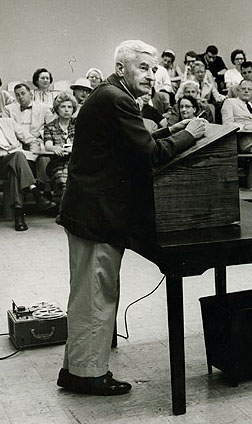Audio Clips
| CLOSE WINDOW TO RETURN TO MAP |

 Photograph by Ralph Thompson © Rector and Visitors, University of Virginia |
During the 1957 and 1958 Spring semesters, William Faulkner was the Writer-in-Residence at the University of Virginia. During that time he appeared at thirty-six different public events, reading from his work and answering over 1400 questions from students, faculty and others. Thanks to two members of the Department of English, Frederick Gwynn and Joseph Blotner, most of those sessions were recorded, and preserved on tape in the University of Virginia Special Collections Library. Over 28 hours of the recordings have been digitized, and are available online in the Faulkner at Virginia audio archive. The mp3 clips available below have been taken from that archive, and are playable on most devices. Was the novel conceived as a sequel? (27 April 1957; 0:45) |
Was the novel conceived as a sequel? (27 April 1957; 0:45)
Frederick Gwynn: Mr. Faulkner—
William Faulkner: Yes, sir.
Frederick Gwynn: When you revived Temple Drake and Gowan Stevens in Requiem for a Nun, I take it that was a later process. It wasn't like The Hamlet and The Town and The Mansion, where you conceived of the whole thing at once?
William Faulkner: Yes, that's right. It was—I began to think, What would be the future of that girl? And then I—I thought of, What could a marriage come to which was founded on the vanity of a—of a weak man. What would be the outcome of that? And suddenly that seemed to me dramatic and—and worthwhile, but that was—you're quite right. I hadn't thought of that when I wrote Sanctuary.
Who is the nun in the story? (30 May 1957; 1:12)
Frederick Gwynn: Yes, sir.
Unidentified participant: In the title of Requiem for a Nun, does the Nun have to refer to [either] Temple Drake Stevens or to Nancy?
William Faulkner: The nun was Nancy.
Frederick Gwynn: [That] she was very separated from the world as a nun is?
William Faulkner: Well, it was in the—the—that tragic life of a prostitute which she had had to follow simply because she was compelled by her environment, her circumstance, to be it. Not for profit nor any pleasure. She was just doomed and damned by circumstances to that life. And despite that, she was capable of within her—her poor dim lights and reasons—of an act, which whether it was right or wrong, was a—was a complete, almost religious abnegation of the world for—for the sake of—of an—of an innocent child. That was—it was paradoxical, the use of the word "nun" for her, but I—but to me that—that added something to her tragedy.
Is Nancy the same character as in "That Evening Sun"? (13 April 1957; 0:31)
Frederick Gwynn: Sir, did you feel any connection between the servant Nancy in Requiem for a Nun and the servant Nancy in "That Evening Sun"?
William Faulkner: She is the same person, actually.
Frederick Gwynn: They both have that incident about Mr. Stovall in the street.
William Faulkner: Yes, she is the same personal actually. These people I figure belong to me, and I have the right to move them about in time when I need them.
Are the theatrical productions "adaptations"? (21 February 1958; 1:23)
William Faulkner: Yes, sir.
Unidentified participant: Mr. Faulkner, one of your novels, Requiem for a Nun, has been adapted to the theater and was successfully presented in Paris and England. Do you feel others of your works might be successfully dramatized, too, and do you plan to do it?
William Faulkner: I—I don't know. I don't know too much about theater. I wrote that book as a play. It wasn't adapted. There were sections of it—it—the story fell into three acts told in dramatic form. It was—I—I think played that way. There were no adaptations and no changes. Of course, there may have been some changes when Albert Camus got hold of it in Paris. He turned it into an existentialist job, but he didn't change it too much. I think the—the version in—in London was about as I wrote it, but it was—was written in that form. I felt, at the time, that that was the most effective way to tell the story I was trying to tell. I think that's one of the tools of the writer's craft, that he is at liberty to use whatever method he thinks does the job best.
Will the play be produced in the United States? (13 March 1957; 1:11)
William Faulkner: Yes, ma'am.
Unidentified participant: Mr. Faulkner, is Requiem for a Nun going to be put on as a play?
William Faulkner: It has been knocking around Europe for about five years. I—I wrote that not as a play but as another of the carpenter's tools which seemed to me the best way to tell a story. There was a young woman. She was a—a—a friend, a sweetheart of—of my youngest brother's, that I knew of vaguely around home in Oxford, and she's trying to be an actress and so she asked me to let her do it as a play, so I gave her the rights to it, and that's why it has never been in the States because she hasn't got enough reputation for anyone to put up the money that a play in this country costs. It will, I assume, reach here in time sooner or later.
Unidentified participant: But you haven't got any idea of your own about how it should be put on or whether there should be a chorus used?
William Faulkner: No'm, I'm not a playwright, and I—I never saw but three or four plays in my life.
